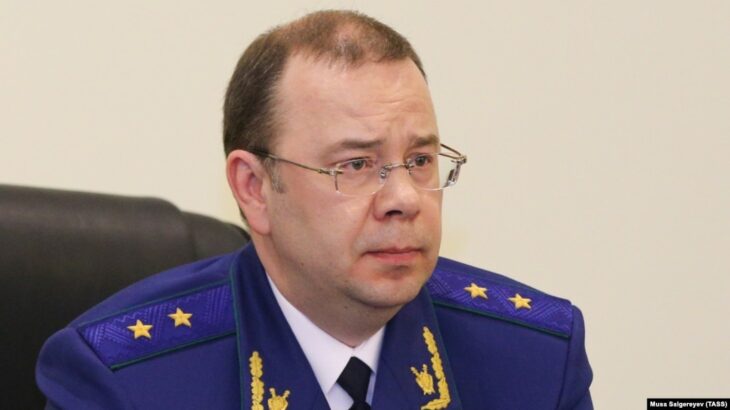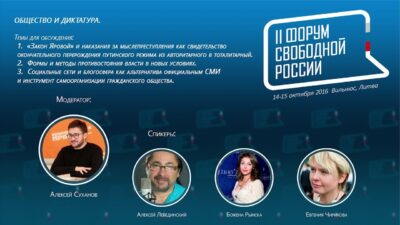
The state prosecutor spearheading a potentially devastating bid to brand Aleksei Navalny’s network of organizations “extremist” is no stranger to the Kremlin foe: In 2019, a report by Navalny’s Anti-Corruption Foundation (FBK) alleged that the lawman’s family controlled undeclared property worth millions of dollars.
The plaintiff in the case under which the FBK, the Citizens’ Rights Defense Foundation (FPZG), and Navalny’s offices nationwide could be declared extremist is the head of the Moscow city prosecutor’s office, Denis Popov.
Popov’s signature also stands at the bottom of an April 26 order freezing the activities of Navalny’s network of regional branches pending the outcome of the Moscow City Court’s closed-door hearings. His office has also asked the court to do the same with the FBK and the FPZG.
The “extremism” case is not the first time Popov and Navalny have clashed. Popov, 48, was named Moscow prosecutor by President Vladimir Putin in September 2019. Previously, he served as chief prosecutor in the Siberian region of Khakasia and the North Caucasus republic of Daghestan.
Popov was the lead prosecutor in the so-called “Moscow case” in 2019, in which several would-be candidates for Moscow district council seats and their supporters were prosecuted for participating in peaceful protests.
‘Lawful Lawlessness’
Popov “personally initiates cases against oppositionists at the behest of the National Guard,” the FBK report published in November 2019 stated. “The Moscow prosecutor plays a very important role in the listing of all sorts of ‘foreign agents.’ Any lawlessness that you run into in Moscow can be declared lawful by Prosecutor Popov.”
Weeks before the report was published, Popov had filed a suit against the FBK and its leadership, including Navalny, seeking reimbursement of nearly 5 million rubles ($67,000) for costs Moscow purportedly incurred during two unsanctioned protests earlier that year. In particular, Popov tried unsuccessfully to seize Navalny’s modest Moscow apartment.
The FBK report, which featured video and text, provided evidence it said linked Popov and his family to undeclared property in Russia and abroad.
The report found that a Montenegrin company controlled by Popov’s ex-wife, Irina Popova, owned a lakeside apartment complex and other real estate worth, according to a financial document filed in Montenegro in 2018, more than 3 million euros.
‘Money From Who-Knows-Where’
The company was created in 2009 and owned all the property at least as early as 2011, when the Popovs were still married.
“All these Montenegrin investments were planned and made by the family of a working prosecutor, bureaucrat, and guardian of the law,” Navalny’s report stated. “With money that came from who-knows-where.”
According to asset declarations filed in Russia during this period, Popov was earning 58,000 rubles ($1,900) a month and his wife was “unemployed.”
Irina Popova also allegedly purchased an apartment in Spain in 2010 for 645,000 euros. And she purportedly owns a fishing resort in southern Russia’s Astrakhan region.
After searching through social media, Navalny’s investigators unearthed and published photographs of the Popovs and their children at all of the properties they identified.
Navalny’s investigators also found a lavish home in the elite stretch of Moscow suburbs known as Rublyovka registered in the name of Popov’s elderly mother, Lyudmila Popova.
After Navalny’s report was published, two Moscow city council deputies, Communist Yelena Shuvalyova and Yabloko party member Maksim Kruglov, appealed to Putin to investigate the allegations against Popov.
In apparent response, Kremlin spokesman Dmitry Peskov assured journaliststhat Popov’s declarations had been “subjected to serious scrutiny.” He added, however, that the presidential administration might take a second look if it was deemed necessary.
Like the rest of the FBK’s investigations into official corruption in Russia, no probe was launched into the findings about Popov.
In her 2014 book Putin’s Kleptocracy, the late American political scientist Karen Dawisha identified the perversion of the law enforcement system — and particularly the prosecutor’s office — as a key feature of Putin’s political model.
She found that “in the 10 years from 2002 to 2012, hundreds of thousands of businessmen were actually imprisoned, not just questioned or arrested, primarily as a result of rivals paying corrupt police, prosecutors, and judges to put away the competition.”





